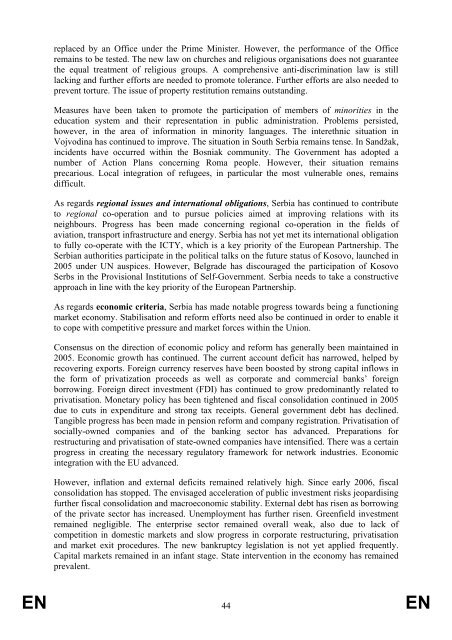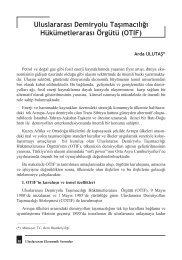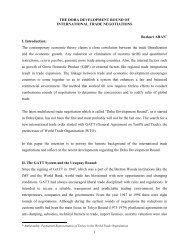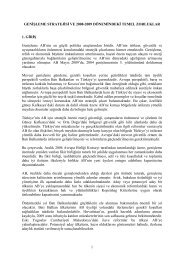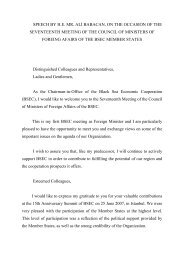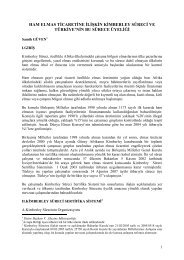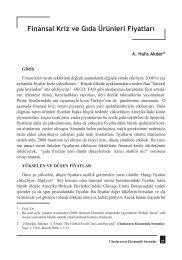Enlargement Strategy and Main Challenges 2006 - 2007
Enlargement Strategy and Main Challenges 2006 - 2007
Enlargement Strategy and Main Challenges 2006 - 2007
Create successful ePaper yourself
Turn your PDF publications into a flip-book with our unique Google optimized e-Paper software.
eplaced by an Office under the Prime Minister. However, the performance of the Office<br />
remains to be tested. The new law on churches <strong>and</strong> religious organisations does not guarantee<br />
the equal treatment of religious groups. A comprehensive anti-discrimination law is still<br />
lacking <strong>and</strong> further efforts are needed to promote tolerance. Further efforts are also needed to<br />
prevent torture. The issue of property restitution remains outst<strong>and</strong>ing.<br />
Measures have been taken to promote the participation of members of minorities in the<br />
education system <strong>and</strong> their representation in public administration. Problems persisted,<br />
however, in the area of information in minority languages. The interethnic situation in<br />
Vojvodina has continued to improve. The situation in South Serbia remains tense. In S<strong>and</strong>žak,<br />
incidents have occurred within the Bosniak community. The Government has adopted a<br />
number of Action Plans concerning Roma people. However, their situation remains<br />
precarious. Local integration of refugees, in particular the most vulnerable ones, remains<br />
difficult.<br />
As regards regional issues <strong>and</strong> international obligations, Serbia has continued to contribute<br />
to regional co-operation <strong>and</strong> to pursue policies aimed at improving relations with its<br />
neighbours. Progress has been made concerning regional co-operation in the fields of<br />
aviation, transport infrastructure <strong>and</strong> energy. Serbia has not yet met its international obligation<br />
to fully co-operate with the ICTY, which is a key priority of the European Partnership. The<br />
Serbian authorities participate in the political talks on the future status of Kosovo, launched in<br />
2005 under UN auspices. However, Belgrade has discouraged the participation of Kosovo<br />
Serbs in the Provisional Institutions of Self-Government. Serbia needs to take a constructive<br />
approach in line with the key priority of the European Partnership.<br />
As regards economic criteria, Serbia has made notable progress towards being a functioning<br />
market economy. Stabilisation <strong>and</strong> reform efforts need also be continued in order to enable it<br />
to cope with competitive pressure <strong>and</strong> market forces within the Union.<br />
Consensus on the direction of economic policy <strong>and</strong> reform has generally been maintained in<br />
2005. Economic growth has continued. The current account deficit has narrowed, helped by<br />
recovering exports. Foreign currency reserves have been boosted by strong capital inflows in<br />
the form of privatization proceeds as well as corporate <strong>and</strong> commercial banks’ foreign<br />
borrowing. Foreign direct investment (FDI) has continued to grow predominantly related to<br />
privatisation. Monetary policy has been tightened <strong>and</strong> fiscal consolidation continued in 2005<br />
due to cuts in expenditure <strong>and</strong> strong tax receipts. General government debt has declined.<br />
Tangible progress has been made in pension reform <strong>and</strong> company registration. Privatisation of<br />
socially-owned companies <strong>and</strong> of the banking sector has advanced. Preparations for<br />
restructuring <strong>and</strong> privatisation of state-owned companies have intensified. There was a certain<br />
progress in creating the necessary regulatory framework for network industries. Economic<br />
integration with the EU advanced.<br />
However, inflation <strong>and</strong> external deficits remained relatively high. Since early <strong>2006</strong>, fiscal<br />
consolidation has stopped. The envisaged acceleration of public investment risks jeopardising<br />
further fiscal consolidation <strong>and</strong> macroeconomic stability. External debt has risen as borrowing<br />
of the private sector has increased. Unemployment has further risen. Greenfield investment<br />
remained negligible. The enterprise sector remained overall weak, also due to lack of<br />
competition in domestic markets <strong>and</strong> slow progress in corporate restructuring, privatisation<br />
<strong>and</strong> market exit procedures. The new bankruptcy legislation is not yet applied frequently.<br />
Capital markets remained in an infant stage. State intervention in the economy has remained<br />
prevalent.<br />
EN 44 EN


